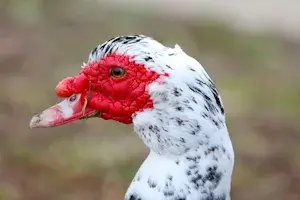Introduction: Why Keep Muscovy Ducks?
Muscovy Ducks, also known as Cairina moschata, are popular poultry birds, both for practical and ornamental purposes. They are well-regarded for their calm nature, robustness, and their ability to effectively reduce pests like snails. Whether kept for meat, eggs, or simply as fascinating creatures in your own garden – keeping Muscovy Ducks is versatile and rewarding. In this article, you will learn how to properly care for, maintain, and breed these unique birds.
1. Muscovy Ducks: An Overview of the Species
Characteristics of the Muscovy Duck
- Origin: Originally from South America, they have since been spread worldwide.
- Appearance: They are characterized by distinctive red warty skin around the eyes and bill.
- Size: The ducks typically weigh between 3–7 kg (males are significantly larger).
- Character: Muscovy Ducks are calm, peaceful, and less noisy compared to other duck species.
Differences to Other Duck Species
Unlike Mallards and their hybrids (e.g., Runner Ducks), Muscovy Ducks are less active in the water and prefer solid ground.
2. Creating a Home for Muscovy Ducks
Space Requirements and Enclosure Size
Muscovy Ducks require plenty of space to feel comfortable.
- Recommended Area: At least 10 m² per bird in outdoor areas.
- Pond or Water Source: Not a must, but a small pond or water trough is appreciated.
Enclosure Setup
A Muscovy Duck enclosure should include the following elements:
- Sleeping Areas: A dry, draft-free shelter, such as a barn with straw or wood shavings for bedding.
- Shaded Areas: Especially important during summer.
- Free Range: A fenced area with grass and soil for scratching.
Fence and Protection from Predators
Since Muscovy Ducks are capable of flight, the fence should be at least 1.5 meters high or covered with netting. Additional protection against predators like foxes, martens, and birds of prey is essential.
3. Feeding Muscovy Ducks
Basic Feeding Principles
Muscovy Ducks are omnivores but require a balanced diet.
- Main Feed: Duck pellets or grain feed like wheat and corn.
- Green Feed: Grasses, vegetable scraps, herbs, and dandelions.
- Protein Sources: Insects, worms, and snails are ideal supplements.
Access to Water
Fresh water must always be available, both for drinking and for cleaning the bill.
Feeding During the Breeding Season
During the breeding season, Muscovy Ducks need protein-rich food to support egg production and the breeding process.
4. Care and Health
Hygiene in the Enclosure
Regular cleaning of the enclosure plays a key role in maintaining the health of the ducks.
- Barn Cleaning: Clean the barn weekly and replace the bedding with fresh straw.
- Water Troughs: Regularly clean ponds or troughs to remove algae and germs.
Diseases in Muscovy Ducks
Muscovy Ducks are resilient but can be prone to certain illnesses.
- Common Issues: Parasites, beak deformities, and egg-binding.
- Prevention: A balanced diet, clean water, and regular checks are crucial.
Veterinary Visits
If there are signs of health issues like loss of appetite, lethargy, or abnormal droppings, it’s essential to consult a vet.
5. Reproduction and Breeding of Muscovy Ducks
Breeding Behavior
Muscovy Ducks are excellent breeders and take good care of their ducklings.
- Breeding Season: Spring to summer.
- Nesting Areas: Provide protected, quiet spaces for them to nest.
Artificial Incubation
Alternatively, the eggs can be incubated using an artificial incubator.
- Temperature: 37.5 °C.
- Humidity: 55–60%, increasing in the final days of incubation.
Raising Ducklings
After hatching, ducklings need warmth and special feed for raising.
- Heat Lamp: Required for the first 2–3 weeks.
- Feed: Starter feed with high protein content.
6. Benefits of Keeping Muscovy Ducks
Effective Pest Control
Muscovy Ducks are hardworking helpers in the garden, eating snails, beetles, and other pests.
Economic Benefits
- Meat Production: The meat of Muscovy Ducks is lean, flavorful, and popular in cooking.
- Eggs: Muscovy duck eggs are larger than chicken eggs and ideal for baking.
Calm Nature
Compared to other duck species, Muscovy Ducks are quieter, making them perfect for residential areas.
7. Legal Requirements and Tips for Beginners
Legal Regulations
Make sure to check regional regulations for keeping poultry. In some areas, registration or vaccinations may be required.
Tips for Beginners
- Start with a small flock (2–4 ducks).
- Ensure enough space and a sturdy enclosure setup.
- Connect with experienced breeders to benefit from their knowledge.
Conclusion: Muscovy Ducks – The Perfect All-Rounders for Your Garden
Keeping Muscovy Ducks is rewarding and relatively simple. With an appropriate enclosure, a balanced diet, and the necessary care, these birds thrive. They not only stand out for their peaceful nature but also for their utility as pest controllers and providers of meat and eggs. Whether you are a hobbyist or an experienced breeder, Muscovy Ducks can enhance any poultry collection.

